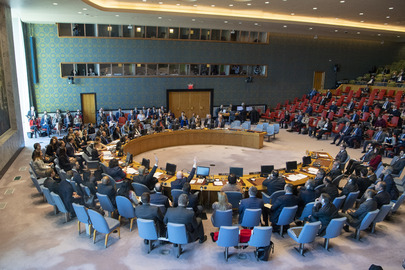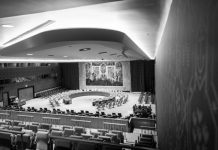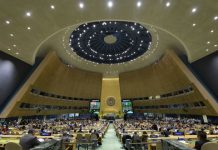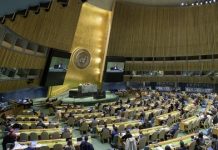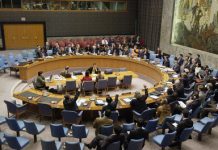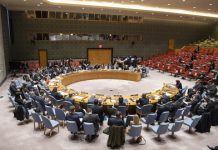Briefing the Security Council, Under-Secretary-General for Humanitarian Affairs Tom Fletcher called on the international community to step up support and do more to protect civilians under fire.
In recent weeks, continued Russian strikes on cities have seen civilian casualties rise – including children – and damaged critical infrastructure including healthcare facilities, apartments, schools and playgrounds.
Mr. Fletcher noted the strike on Friday in the densely populated city of Kryvyi Rih in the Dnipro region, in which at least nine children were killed, according to Ukrainian authorities.
“This brutal pattern of civilian death and destruction in populated areas must stop,” he said.
He said parties to the conflict must protect civilians and civilian infrastructure as required under international humanitarian law.
“Indiscriminate attacks on them are strictly prohibited: there must be limits to how war is waged.”
Tom Fletcher, UN Emergency Relief Coordinator, briefs the Security Council.
Displacement and desperation
The war continues to drive mass displacement, with nearly 3.7 million Ukrainians uprooted from their homes inside the country, and a further seven million now living as refugees.
Civilian casualties and infrastructure damage has also been reported in the Kursk, Belgorod and Bryansk regions of Russia. In addition, humanitarians are unable to reach an estimated 1.5 million civilians in Russian-occupied areas of Donetsk, Kherson, Luhansk and Zaporizhzhia.
“International humanitarian law demands that the parties facilitate the rapid, unimpeded passage of humanitarian relief for civilians in need, wherever they are,” Mr. Fletcher emphasised.
The impact on women has been particularly severe.
Critical aid programmes at risk
There has been a staggering 36 per cent increase in gender-based violence, alongside rising maternal health risks. Alarmingly, nearly half of all births in Ukraine since 2022 have been pre-term, a sign of the immense stress and hardship endured by expecting mothers.
Despite the soaring needs, the $2.6 billion UN-led humanitarian response plan in Ukraine has received only about 17 per cent of funds needed.
Mr. Fletcher warned that without additional financial support, critical aid programmes will be scaled back, leaving millions without food, healthcare or shelter.
In response to funding shortfalls, humanitarians are prioritising four key areas: supporting frontline communities, emergency response, facilitating evacuations, and assisting the displaced.
Mr. Fletcher stressed the need for increased financial support to ensure humanitarian operations can continue reaching those most in need.
“If you cannot stop the attacks on civilians – in Ukraine and elsewhere – at least give us the security we need and resources to save as many survivors as we can,” he urged.
A wide view of the UN Security Council chamber as members meet to discuss the maintenance of peace and security of Ukraine.
More to follow…
Source of original article: United Nations (news.un.org). Photo credit: UN. The content of this article does not necessarily reflect the views or opinion of Global Diaspora News (www.globaldiasporanews.net).
To submit your press release: (https://www.globaldiasporanews.com/pr).
To advertise on Global Diaspora News: (www.globaldiasporanews.com/ads).
Sign up to Global Diaspora News newsletter (https://www.globaldiasporanews.com/newsletter/) to start receiving updates and opportunities directly in your email inbox for free.


